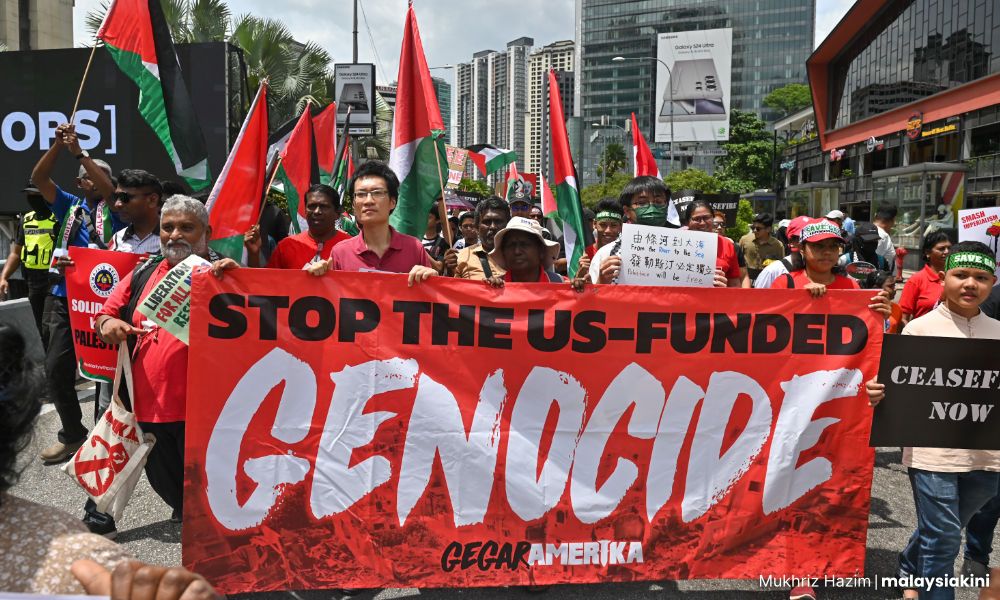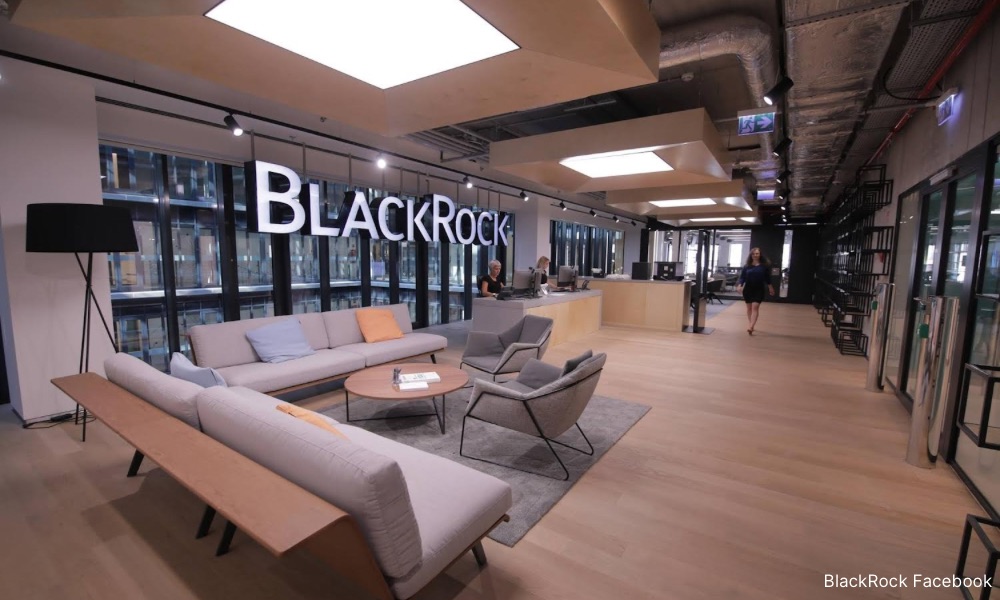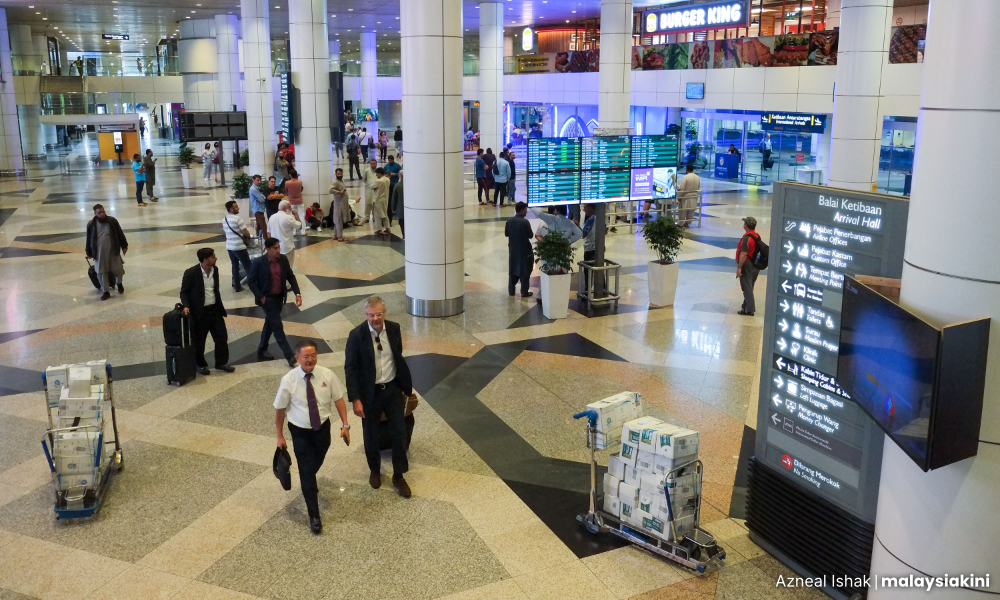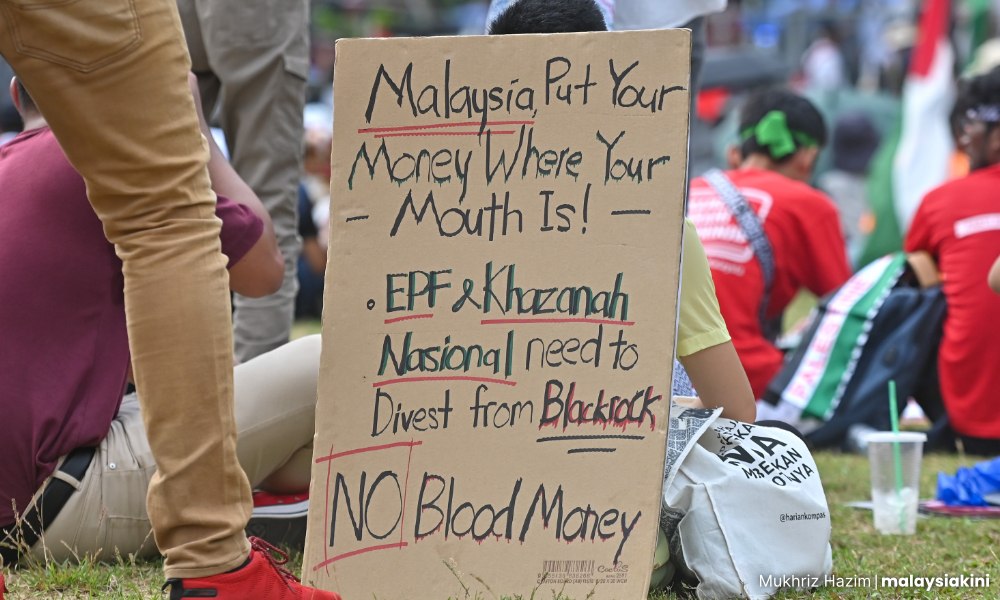Before going into the issues related to boycotts and Malaysia Airports Holdings Berhad (MAHB), I would like to respond to some points raised by P Gunasegaram in his article, “Must friends of Israel be our enemies?” published on June 7.
Generally, I have high regard for Gunasegaram’s writings on various important national issues. I am disappointed at his attempt to invalidate a major humanitarian cause in a trying time.
Instead of constructive suggestions on how one can express solidarity more effectively, Gunasegaram repeated some typical biased ideas about the boycott campaign.
His contention summed up as follows:
(1) Boycotts hurt us (more than Israel), therefore, we should stop these emotional campaigns;
(2) Be reasonable, it is unnecessary to antagonise all friends of our enemy;
(3) By this logic, we should not reject a beneficial deal with Blackrock just because it supplies weapons to Israel.
These arguments centred around the purported contradiction between national interest and fanatic passion. Quite naturally, people are persuaded to a predictable conclusion, ie “The expression of international compassion is fine, but it should not hurt national interest”.
I believe it was not Gunasegaram's original intention. However, his flawed deduction gives credence to the prevailing indifference towards the Palestinian plights.

Probably not consciously, the discourse unfortunately alludes to the divisive communal attitude towards Palestine. This is extremely unhelpful for social harmony.
For that reason, these arguments must be answered properly and rationally.
Why boycott?
Now, the case for boycotts.
The contempt for boycotts often sounded “reasonable” because it corroborates our intuitive bias. The bull’s eye of anti-boycotts is a straw man: the zealous activists yelling for boycotting any products that have the slightest link with Israel. Such misrepresentation is commonly used to scorn boycotts.
Boycotts are often characterised as driven by emotional sentiment. There is nothing more sensible and rational than empathy. Offering sympathy or relief to those suffering is the most logical human response. Frequently, we even help others at the expense of our own welfare.
In reality, the pro-Palestine movement never lump all friends of Israel as enemies. In Malaysia, the solidarity actions mainly target one country in particular. It is because the United States is complicit in Israeli genocide. Even then, nobody had ever called for cutting diplomatic ties with the US.
The core issue is a colossal humanity tragedy in Palestine right in front of our eyes. Israel is intensifying its ethnic cleansing offensives in Gaza and the US is condoning it. Surely there is an imperative to stop it urgently - by any means.
Rejecting boycotts is essentially an excuse for inaction. In a time of extreme atrocity, being inactive is siding with tyranny. The act of boycott is an exercise of consumer conscience.
The objective is to transform action by singular individuals into collective power. Far from being impulsive, the boycott campaigns have emerged as a global movement with well-organised plans and strategies.
Historical success of boycotts
Don’t forget international boycotts contributed to the successful ending of apartheid in South Africa. The dismissal against pro-Palestine boycotts was identical to the anti-apartheid boycotts previously. Not surprisingly the old apologists of the white regime are the same countries defending Israel today.
Throughout history, boycotts have been the weapon of the oppressed. The Mahatma Gandhi-led mass boycotts against British goods galvanised the Indian non-violent struggle for independence. In Myanmar, Aung San Suu Kyi appealed for international sanctions to end the military rule.
Today the Boycott, Divestment and Sanctions Movement (BDS) inherited this legacy, and it continues to struggle against the illegal occupation of Palestine. The movement has become the main thrust of Palestinian solidarity activism worldwide.
BDS campaigns are spreading like wildfire on American and European campuses.
While the conservative authorities chide the student protests as utterly naive and futile, we should salute their passion and courage.
For a long time, the people in Palestine have been courageously resisting Zionist brutal oppression. For supporters outside Palestine, possibly the most meaningful and impactful contribution to the struggle is engaging in the BDS campaigns.

The BDS movement adopts a targeted and result-oriented strategy. The campaigns do not compel anyone to throw away their Apple handphones, or MacBook, or stop flying with Boeing. BDS informs a consumer to make careful ethical choices. One is required to use extra efforts to verify and check the products and opt for alternatives if available.
In addition to consumer action, the corporate sectors must also participate in divestment and boycott. Similarly, governments are urged to introduce strategic investment policies to isolate Israel. The ultimate goal is to persuade people to dissociate from pro-Israel corporations and shift to alternative investments.
Boycotts hurt our economy?
Many argued that Israel’s economy is not affected by these well-meaning actions at all. Instead, boycotts are bad for our economy. Conveniently cynicism is decorated with the respectability of patriotism.
Recently, some news reported that several international franchises suffered substantial losses due to the boycotts. It is said that many outlets have closed down. This is cited as evidence of the damaging effect on our economy. With a condescending tone, they also highlight that the majority Muslim population are the main victims.
Such reckoning assumes that when it hurts certain corporations, it also means hurting the overall economy. In economic theory, this is called the fallacy of composition. It presumes that what is true for an individual or part will also be true for the whole group or economy. This is a common logical error that misleads our understanding of economic phenomena.
Will the entire economy suffer from the changing preferences of consumers? If the majority in society switch from a particular goods to another, the market will simply adjust to secure continual profitability. Enterprises know how to redirect their investment to suit popular demands. It happens all the time in the market economy.
Unlike decades ago, nowadays consumers incurred much less inconveniences due to the abundance of choices available. If people wish to boycott American brands of burgers or fried chicken, there are many local varieties to choose from.
The shifting consumption preferences will definitely have a positive effect on local businesses. The contraction of international franchises also means less cash outflow from the domestic economy. In the long run, we cultivate a much healthier and domestic-oriented consumer culture.
Lastly, boycotts are essentially bargaining gambits. If these international brands value our market, they must make some hard choices. Enterprises could stay profitable only if they concede to ethical demands by denouncing genocide or pulling themselves out from the illegally occupied territories.
Malaysia has a market close to 30 million, compared to 10 million in Israel. The market size of countries that are not “friends” of Israel is much larger. Our collective economic power can pressure companies to change.
Who is our friend?
The privatisation of Malaysia Airports Holdings Berhad (MAHB) has an international dimension for the involvement of international players. Some said we should not antagonise friends of our enemy. This sounds like good advice. We were told that each country should set its national priorities and respect each other’s rights.
What is the foreign policy of the so-called largest democracy in the world? Respect differences, really?
Take South Africa as an example. The lawsuit in the International Court of Justice (ICJ) brought the country into direct and indirect confrontation with friends of Israel. South Africa risked being kicked out of the African Growth and Opportunity Act by the US government.
Should South Africa prioritise its economic interest and abandon its case in the ICJ? It is quite clear the US does not respect the right of any country to freely befriend those who are not friendly to the US.
Our declaration of neutrality does not save us from American intimidation. The US constantly threatened Malaysian companies for allegedly being too friendly with its enemies. Invoking the pretext of security, the champion of free trade has no qualms to weaponise trade against anyone who challenges its hegemony.
The US has a long list of enemies, eg Cuba, Iran, Syria, Yemen, Nicaragua, Venezuela, China, North Korea, and many more. The US imposed sanctions and boycotts on these countries. Anyone appearing friendly to the enemies of the US is not spared from sanctions.
Acting like the sole superpower in the world, the US is not willing to accept or tolerate a multipolar world order. Not only countries that are hostile to Israel are deemed as a threat, but friends of the enemies of Israel are often the targets of subversion.
The economy of Malaysia is not jeopardised due to the government’s principled stance on supporting Palestine. Rather, it is the rising US antagonism towards China that makes our economy vulnerable.
Geopolitical concerns
It is in this context that we are concerned with our strategic assets.
On May 15, the government announced the plan to privatise MAHB. It will be taken over by a consortium known as the Gateway Development Alliance which includes Khazanah Nasional Berhad, Employees Provident Fund (EPF), Abu Dhabi Investment Authority (ADIA), and Global Infrastructure Partners (GIP).
With this arrangement, 38 airports (all airports in Malaysia except Senai) plus an international airport in Turkiye will thus be operated by the GIP.
In turn, GIP is wholly owned by Blackrock Inc. Blackrock is the world's largest investor in arms industries. The firm is also a strong supporter of Zionism. Many others have presented irrefutable evidence of the complicity of Blackrock with the genocide in Gaza.
I do not need to elaborate. In short, rejecting Blackrock is a moral imperative. The government must show policy consistency in its stand for Palestine.

There is also a geopolitical dimension to this issue. The violent clashes in Palestine and the Middle East warn us of the growing animosity between superpowers. Small countries are often caught in crossfires and risk losing their sovereign power.
Malaysia is located in a potential conflict zone. Our air space transverses across the South China Sea and encompasses many disputed territories. As the US is also a factor in the regional conflicts, their access to our air space and strategic infrastructure may become an additional impetus to the escalating tension.
Is it wise to hand over our sophisticated sensitive facilities such as airports, radar, surveillance equipment, as well as air control systems to a foreign entity? Worse still, a company infamously linked to wars.
To safeguard national sovereignty, important strategic infrastructure must only be managed by an operator who is absolutely and exclusively loyal to Malaysian interests.
Precarious privatisation
The total assets of MAHB are valued at no less than RM20 billion. A large-scale privatisation without thorough discussion and public scrutiny in itself should raise a red flag.
On Feb 9 last year, MAHB was granted a new extension of operating rights for another 45 years. This means MAHB will hold a monopoly control until Feb 11, 2069. This was reaffirmed by the announcement of Transport Minister Anthony Loke on March 18.
In general, a monopoly is not a recipe to enhance competitiveness or improve efficiency. Arguably, the long duration is needed to facilitate sustainable growth and warrant the recovery of huge investments.
The MAHB management claimed that the long lease of operating rights would give “the flexibility to invest and reinvest in the modernisation and development of viable airports under fair and conducive commercial terms with a clear investment return mechanism”.
It is not unusual in Malaysia for a GLC to be provided such favourable terms. Despite the danger of prolonged stagnation, with some degree of scepticism, I think it is acceptable if these conditions safeguard key infrastructure in public hands.
MAHB managing director Iskandar Mizal Mahmood was also quoted as saying that the granting of the new lease is a reflection of the government’s confidence in the firm’s capabilities and experience in managing and operating airports locally and internationally.

A year later, surprisingly an American company, General Infrastructure Partners (GIP) was brought in to operate all 39 airports. Either the government has suddenly lost confidence in the competence of MAHB or it was merely a sinister maneuver to manipulate the transfer of the public assets to a foreign firm.
As late as March 11, Loke insistently denied the intention to sell MAHB to GIP. When the plan was finally revealed in May 2024, Loke maintained that his ministry was not involved in the decision.
If the minister is telling the truth, it is very alarming. The privatisation deal will affect millions of users and seal the fate of all our airports for nearly half a century. Until today, citizens still have no opportunity to hear all the pros and cons.
Essentially, the new avatar of MAHB will be a privatised monopoly (for 45 years!). Malaysians have plenty of bitter lessons from privatisation, especially those of a monopoly nature. These schemes have not only failed to deliver the benefits as promised, but in the end, taxpayers picked up the bills.
A similar scenario happened in 2009 when Tradewinds acquired the monopolistic Bernas, it involved substantial minority shares held by Hong Kong-based Wong Tak Co.
Opposition MPs were up in arms. They argued that the presence of foreign interest in Bernas undermined national security. Once in power, the same people are now welcoming Blackrock to operate our critical assets.
The government’s unwillingness to debate the sale of MAHB has betrayed all its principles of transparency, accountability, and social responsibility. Members of the public are in the dark. They only picked up information in fragments from poorly crafted incoherent replies from the ministers and officials.
Until now, nobody from the government has given a clear explanation about the rationale to privatise MAHB. We are yet to be told what actual benefits the GIP will contribute in the next three decades. We would also like to know whether Khazanah has gone through the process of exploring all possible options. Was the GIP the only choice?
For the sake of economic inclusion, why wouldn’t we consider the participation of state governments (especially the Borneo states), or allow domestic private investments?
In short, with all these questions unanswered and the absence of a satisfactory explanation, the government should not proceed with the MAHB privatisation.
Immoral investor
The involvement of Blackrock is like adding salt to the wound. The company’s association with arms supplies to the genocidal war is glaring. No moral justification whatsoever to allow money from peace-loving Malaysian taxpayers and EPF subscribers to be tainted with innocent blood.
The financial giant has an extensive footprint within Israel’s economic landscape. It is closely linked to Israel’s corporate and political establishment. With this background, our concerns are beyond purely ethical.
Inevitably, there will be grave security implications for submitting sovereignty-related assets to a foreign operator. It is worse when it is connected to a company holding irreconcilable opposing political ideologies.

Malaysian support for Palestine cannot remain lip services. More than ever, Palestinians are in desperate need of consistent solidarity efforts. Rhetorics and superficial public relations exercises cannot materialise any useful results.
It is time to turn words into concrete actions. The government on the one hand embraces Palestinian armed resistance and simultaneously welcomes genocide enablers with open arms. This will make Malaysia look hypocritical.
Undoubtedly, Blackrock has already penetrated the Malaysian market for quite some time. It has invested extensively in many Malaysian firms such as CIMB, Genting, MISC, Sime Darby, etc. Its prominence in our capital market and financial system is another cause of concern.
However, this cannot vindicate its takeover of MAHB. The entry of Blackrock in the midst of massacres in Gaza will leave a dark mark on Malaysia’s credibility.
Despite the prime minister's passionate appeal and vocal outcries from politicians, the Malaysian government has not successfully executed any new sanctions or divestments since the Israeli military assault last October.
To effect change, the government must assert greater pressure on the economic front besides diplomatic endeavours. To demonstrate Malaysian commitment, the government should set up a task force (with the involvement of civil society) to implement divestments and sanctions.
The government in concert with the private sector should increasingly reallocate funds to more ethical investments.
As we learned from South Africa, sanction was a powerful and effective instrument to combat apartheid. The situation in Gaza manifests a despairing humanity crisis. Our conscience should not allow the industry profiteering from bloodshed to lay a hand in people’s assets.
Stop Blackrock, defend our assets. - Mkini
TIAN CHUA is former Batu MP.
The views expressed here are those of the author/contributor and do not necessarily represent the views of MMKtT.



No comments:
Post a Comment
Note: Only a member of this blog may post a comment.